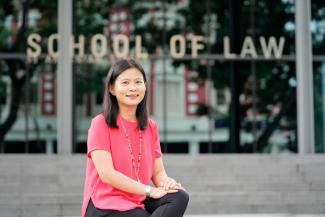
SMU Associate Professor Tan Seow Hon probes the law’s philosophical foundations in order to enrich its practice.
By Sim Shuzhen
SMU Office of Research & Tech Transfer – Most of the time, lawyers and laypersons alike are simply concerned with what the law is on a particular issue, so that they can determine whether or not it has been broken – and if so, what the consequences are.
Legal philosophers, by contrast, are interested in the very foundations of law – its definition, purpose and function, what gives it legitimacy, and its interaction with other aspects of society, such as morality and politics. While these key questions in jurisprudence – the study of the philosophy of law – may seem irrelevant outside the ivory tower of academia, they are in fact extremely pertinent to the practice of law in the real world.
“If these questions are neglected or forgotten in a pragmatic society, as they tend to be, we can have laws that facilitate the achievement of certain short-term social goals but which are not necessarily just,” says Associate Professor Tan Seow Hon, who specialises in jurisprudence and legal theory at the Singapore Management University (SMU) School of Law.
Dealing with diversity
Law-making is particularly tricky in societies which accommodate a diversity of views and beliefs, as compared to more homogenous societies where there is a strong consensus in public opinion. Exploring the bases of laws in pluralist societies has thus become one of Professor Tan’s major research interests.
“Given that citizens have different worldviews, different notions of morality and different religions, what reasons can justify particular laws that restrict so-called private acts?” she asks, noting that some laws enforce controversial moral norms that not everyone subscribes to.
A good example of this are the laws surrounding physician-assisted suicide and voluntary active euthanasia, practices that are now legal in an increasing number of jurisdictions around the world, says Professor Tan.
Proponents of legalising euthanasia tend to invoke individual autonomy, arguing that those who choose to end their lives do so without harming a third party, says Professor Tan. “It is thought that those who believe in the sanctity of life can simply choose not to undergo euthanasia, but should not prevent those who seek euthanasia on the grounds of irreversible and unbearable suffering from ending their lives.”
Thus, laws that prohibit euthanasia tend to be viewed as illiberal, while permissive laws tend to be thought of as more acceptable, she adds. In addition, because these so-called illiberal viewpoints sometimes coincide with religious reasons against the practice, the two are difficult for people to separate. “Some mistakenly assume that the only justifications for prohibitive laws are religious ones, which are unacceptable in a pluralist democracy,” explains Professor Tan.
A secular case against euthanasia
In a 2017 paper in the Singapore Academy of Law Journal, titled ‘The case against physician-assisted suicide and voluntary active euthanasia: A jurisprudential consideration’, Professor Tan examined whether Singapore’s Advance Medical Directive Act, which has been in force for some 20 years, should be amended to allow physician-assisted suicide and voluntary active euthanasia.
Religious beliefs, she found, are not the only justifications for opposing euthanasia. “I argued that opposition to assisted suicide can be motivated by a concern for the dignity of those at the end-stage of their lives – that they are not worth any less just because they are worth less to others or no longer useful to society, and that many at the end-stage of life need far more support and love to find the strength to live,” she explains.
In addition, permissive laws in other jurisdictions have led to euthanasia being made legal for children (in Belgium) and for the legally and medically incompetent (in the Netherlands). Permitting euthanasia, therefore, could result in a slippery slope, leading to attitudinal changes such as a weakening respect for the sanctity of life, thinks Professor Tan.
“More crucially, on principle, if autonomy can be given primacy over sanctity of life for particular groups of persons who are allowed to choose to die, are the lives of these groups of persons devalued as the state now supports their right to choose suicide, signalling that it agrees their lives are possibly not worth living?” asks Professor Tan. Based on these concerns and others, her paper concluded that Singapore’s prohibition on euthanasia should remain.
Tackling thorny issues
Professor Tan is now in the early stages of exploring another hot-button issue related to human life: commercial surrogacy. Currently not directly regulated in Singapore, the practice appears at first blush to benefit all parties involved: the commissioning parents fulfil their intense desire to have a child, the surrogate receives substantial financial compensation, and the child’s life is highly valued by the commissioning parents.
In reality, however, commercial surrogacy is fraught with many ethical and legal issues, including the commoditisation of wombs and children, says Professor Tan. “I’m analysing surrogacy to see if it serves human flourishing or detracts from it,” she explains.
Given the controversial issues that are their bread and butter, legal philosophers may not always find themselves a hit at cocktail parties. “Research on the proper bases of laws in pluralist societies often concerns issues that trigger visceral reactions from people – the sort of topics one might avoid discussing over dinner,” shares Professor Tan. “Articles on such intractable issues can evoke strong reactions from those who disagree.”
But probing at these uncomfortable yet foundational issues is necessary for legal systems to progress, thinks Professor Tan. “If we only study the applicable rules within a subject area of law without looking at the philosophical foundations, we would lack the vision for transforming or developing that area of law, or even properly interpreting extant rules, and our practice of law would be impoverished,” she emphasises.
Back to Research@SMU Issue 53
Image credit: Cyril Ng